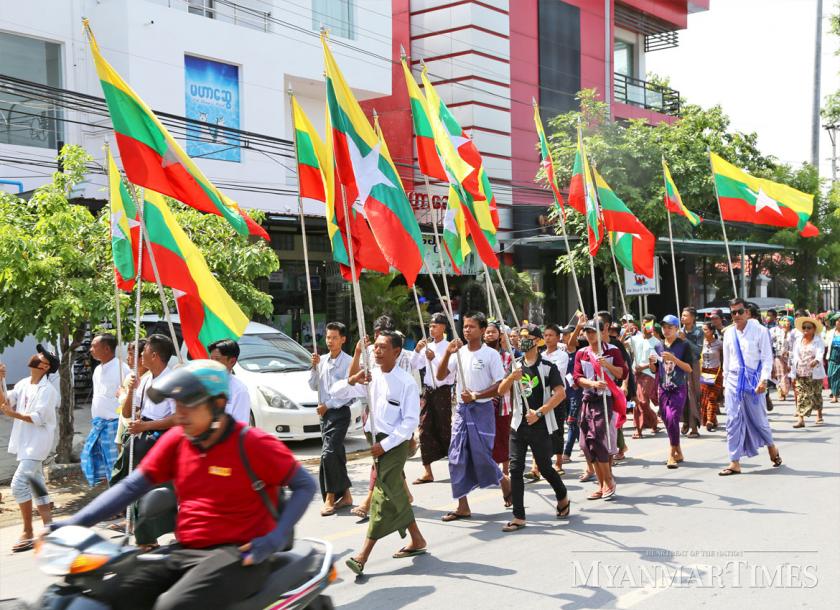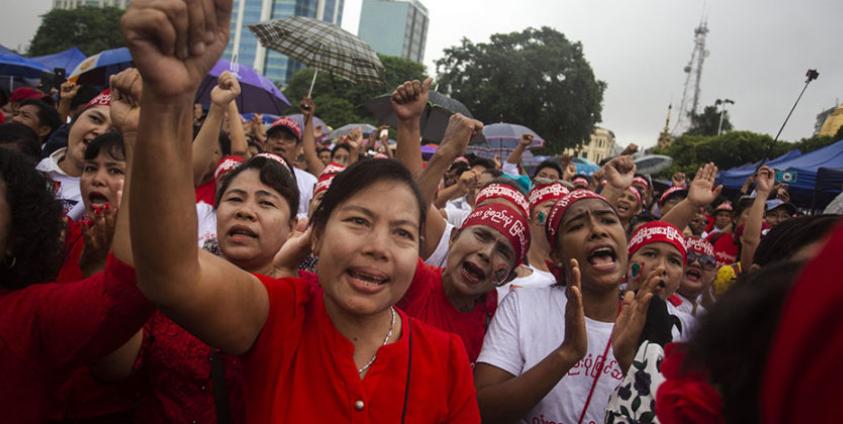Following the July 15, 45-member constitutional reform committee submission to the Union Parliament, in a report which includes over 3,700 recommendations covering 457 provisions made by 14 political parties, public rallies both for and against the committee amending the 2008 constitution took place around the country on on July 17 and is still ongoing.
Myanmar constitutional amendment
The report is just a compilation of suggestions by the political parties and it is still a long way to go before anything substantial could be done and implemented. But nevertheless, parties’ positions are spelled out in quite a clearer way, which so far have been only vaguely known to the public.
Accordingly, Shan Nationalities League for Democracy (SNLD) made the most amendment with 1112, Arkan National Party (ANP) with 858, Mon National Party (MNP) with 641, the National United Democratic Party with 462, the Ta’ang (Palaung) National Party (TNP) with 178, the Pa-O National Organization (PNO) with 137, the National League for Democracy (NLD) with 113 and Union Solidarity and Development Party (USDP) with 10 recommendations.
The NLD that spearheaded the parliamentary constitutional amendment approach although it made less recommendations than the Ethnic Political Parties (EPPs).
According to the constitutional reform committee report the EPPs wanted the military or Tatmadaw to leave the political arena for good all at once without reservation, while the NLD is for gradual phasing out, which should be reduced in stages, starting 2020, with 15%, 10% and 5% respectively in three legislature period amounting to 15 years time span.
NLD
The point that the NLD made just over one hundred amendment recommendations is explained as its treading carefully not to upset the Tatmadaw unnecessarily.
“We give priority to national reconciliation. If we alter the constitutional amendment comprehensively according to the democratic federal system it will be hard to follow suit for the Tatmadaw. We recommend only more than a hundred points for we want to go stage by stage in the principle of national reconciliation,” said NLD spokesman Dr Myo Nyunt.
There are criticism that the NLD is doing all these just to fulfill its election campaign promises even though it knows constitutional amendment could be hard to achieve.
Regarding this speculation Dr Myo Nyunt said: “We try to amend it because we believe it could be done. Constitutional law is not something that is going to stand still and could always be amended. So stage by stage amendment process will be carried out. And even if it is satisfactorily altered, according to the change of era and condition it has to be changed again.”
The NLD in its constitutional amendment section 12, particularly paragraph 436, it suggested that Tatmadaw appointed representatives be left out and 67% elected MPs’ two third approval should be the basis regarding the amendment.
Moreover, there is surging optimism that paragraph 436, which is most crucial to overcome the Tatmadaw’s veto power for the amendment, could be overcome among the NLD leadership, given that it occupies 59% seats, EPPs 11% and USDP only 5%.
The NLD also recommended to repeal paragraph 59(f) section 3, qualifications of the president and vice-presidents, to pave way for its leader Aung San Suu Kyi to take up the position of the president. This paragraph prohibits anyone to be president whose spouse and children are foreign nationals.
EPPs
The EPPs in principles are in agreement with the NLD in trying to change the paragraph 436 and also to abolish the 59(f) but differ in recommendation regarding the continued role of the Tatmadaw in political arena.
It is for the total withdrawal of the Tatmadaw all at once from political scene and also the curtailing of commander-in-chief appointment by the president according to the selection and endorsement of the National Defense and Security Council (NDSC), dominated by the military, and instead appointed by the president who is endorsed by the defense minister. Further, the EPPs also suggested to repeal the commander-in-chief’s power to appoint the home, defense and border affairs ministers.
Regarding the state structure section 2, ANP recommended a union based on equitable ethnic states. The SNLD suggested 8 ethnic states formation, with the creation of a Bamar state from 7 regions, which should all be equal and have rights to draw up state constitution according to their respective electorate aspirations. MNP echoed the same as ANP and SNLD but the PNO and TNP accepted the present 7 states and 7 regions setup, but asked for the formation of more new self-administrative zones.
The 7 divisions, now renamed regions, were formed by virtue of Burma Socialist Programme Party (BSPP) one party dictator, military regime’s 1974 constitution, which the EPPs consider to be illegal as the consent of the people were not asked. They further see the 7 regions as a way to balance and dominate the 7 ethnic states’ political power usage within the parliament.
Regarding paragraph 11(b), section 1 basic principles of the union, ANP, SNLA and MNP are the same in their suggestions that the three branches of sovereign power, the legislative, executive and judiciary powers are to be distributed among the union government and state governments.
However, the SNLD detailed that it promulgated union, state and residual powers; residual powers given to the union by the states; and the remaining powers that are not mentioned in union, state and residual rested with the states, which are union members.
Regardless of all these energy consuming troubles in giving suggestion to the constitutional amendment, the EPPs are not too optimistic that the deliberation to change the constitution will be easily achieved.
Pe Than, MP from ANP said that amendment could only be successful if there is a negotiated adjustment between the ruling government and the Tatmadaw. He said: “If the amendment is done without consultation it will be like drawing picture on the water.”
Likewise, second general secretary of SNLD Sai Kyaw Nyunt, on the difficulty to go through the process according to paragraph 436 which needs to gather more than 75% votes in the parliament, said: “At the moment it is not foreseeable that it will succeed. If ways to overcome this (obstacle) could not be found, there is no way that it (amendment) could happen.”
Military bloc
The military bloc made up of USDP and the appointed Tatmadaw MPs are basically against the constitutional amendment. While the USDP chip in on minor amendment with 10 recommendations, the Tatmadaw maintained that what the NLD doing is against the constitution and any amendment has to be done according to the section 12, amendment of the constitution.
On July 17, brigadier-general Maung Maung, leader of the military-appointed lawmakers in Parliament, told the reporters in Naypyitaw that attempting to amend articles of the constitution is dangerous.
“We haven’t decided whether to join parliamentary discussions over [the committee’s report] or not, but since the beginning we’ve opposed it…As you all see, there are 3,765 proposed changes. If we look at those, we can see how much those are harmful for our country’s constitution,” he said, according to the recent report in The Irrawaddy.

People protest against charter amendments in Mandalay on Wednesday. Kyaw Ko Ko/The Myanmar Times
Outlook
Given such development and positions, the NLD might be upping the ante in the run-up of the 2020 election or it could also has a genuine desire to change the political equation, as without which the country is going nowhere, politically and economically.
The EPPs’ goal have been clear from the outset for their main aims are to let their displeasure and political positions known to the public, rather than the hope that they will be able to alter the military-drafted constitution to be democratic and federal.
The military bloc will certainly use all means to block the amendment and nobody knows what will happen next if the amendment would be able to proceed using simple majority of the NLD and EPPs circumventing the Section 12, amendment of the constitution.
For now, the debate in the parliament that is scheduled to take place in the very near future is the only game in town which all are bound to keep an eye on.






